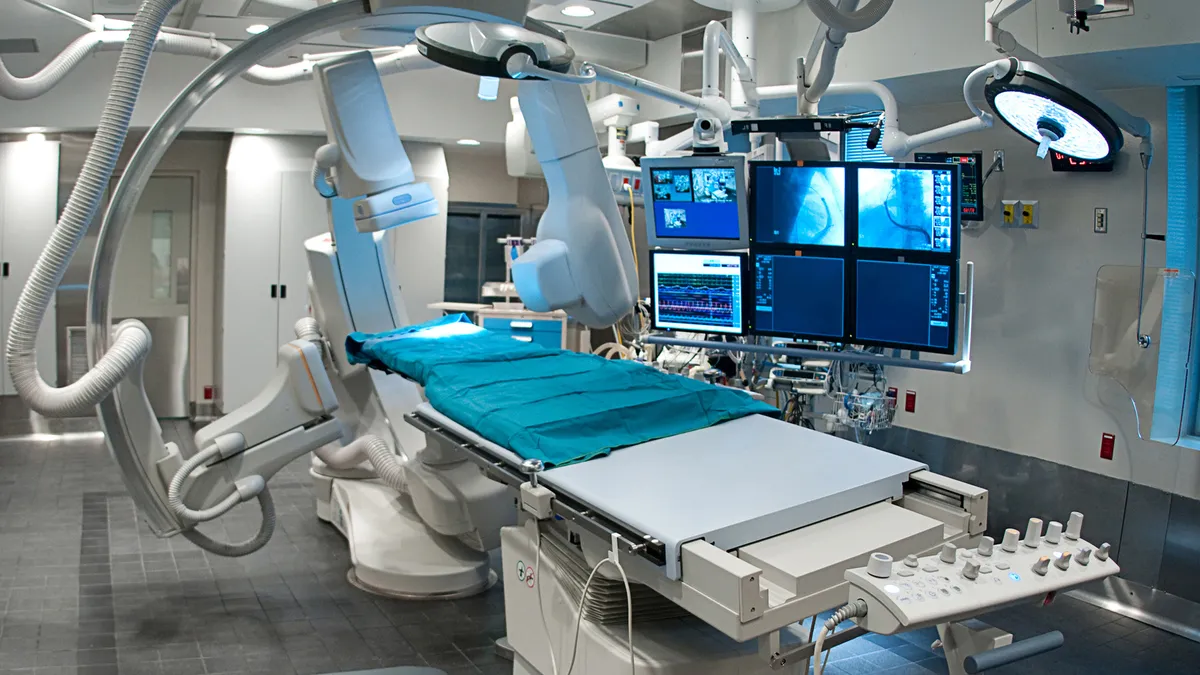Hospital spending on capital equipment is on an upswing, signaling a stronger outlook for surgical procedures guided by robotic systems in the year ahead, medtech executives said on their first-quarter earnings calls.
The activity mirrors a boom in the broader economy to start 2021 that points to a recovery from the pandemic-driven recession, but the strength of demand from the hard-hit hospital sector surpassed expectations.
"As procedures are coming back, we're seeing through our order book that hospitals are in actually very good financial position. And better than, frankly, I would have expected when the pandemic first hit," said Stryker CEO Kevin Lobo.
Hospital finances are significantly healthier than they were following past economic downturns, he said. That solid footing bodes well for sales of Stryker's Mako robotic platform for knee and hip surgery as procedure volumes return to more normal levels. The CEO cited the order book for capital equipment as a key factor in Stryker's forecast for company-wide organic sales to accelerate 12% to 14% this year over 2020.
Mako followed a strong fourth quarter with a "banner" first-quarter performance, fueled by an upturn in international installations, according to the CEO. System placements, Lobo said, are an early indicator of future implant growth.
Similarly, Intuitive Surgical executives said robust capital placements in the first quarter, coupled with a rebound in the use of its installed systems, indicates a need by customers to return to surgery and shows that hospitals are preparing for a post-pandemic environment.
"On the capital side, new system placements continue to exceed our expectations," said CEO Gary Guthart. "We know that new system placements are closely tied to anticipated procedure volumes and system utilization in mature markets."
Intuitive shipped 298 da Vinci robots in the first quarter, up 26% from a year ago, boosting its installed base to 6,142 systems as of March 31, up 8% from a year earlier. The company said it saw particularly strong placements of its robots in the U.S., China, France and the U.K. during the quarter.
The better-than-expected demand suggests "hospital capital budgets were less impacted by COVID than originally anticipated," analysts at Stifel wrote in a note to clients. Intuitive's first-quarter results topped expectations across all key metrics: revenue, earnings per share, procedure growth and system placements, according to the note.
Procedures performed with installed Intuitive systems climbed 16% in the quarter, recovering in February and March after a sluggish start in January. The rebound tracked with a slowing pace of new COVID-19 cases. First-quarter revenue jumped 18% from last year to $1.29 billion.
Intuitive predicted procedure growth would expand in the range of 22% to 26% in 2021, compared to a rise of just 1% in total da Vinci procedures last year. The forecast is based on the assumption that new COVID-19 cases remain on a downward path.
Tempering its rosy outlook, Intuitive executives said leasing is expected to increase as a percentage of sales over time as customers access capital through alternative financing arrangements, causing revenue to be deferred to future periods. Leasing represented 43% of its system placements in the first quarter, compared with 32% last year and 37% in the fourth quarter, the company said.
Further, management cautioned that the company will face competition in various markets, which could bring with it price pressures and longer selling cycles.
Medtronic's Hugo soft-tissue robotic system could launch as soon as the fourth quarter to take on the robotic surgery leader, while Johnson & Johnson is due to begin first-in-human clinical trials for its Ottava system in the second half of 2022.
Stryker rival Zimmer Biomet reported strong momentum for its Rosa knee robotic surgery platform in the first quarter. Zimmer Biomet CEO Bryan Hanson called the system's fourth-quarter performance "fantastic" and said the momentum continued into the first quarter, both in the U.S. and internationally.
The company said it plans to launch its Rosa hip application in the second half of this year. A partial knee application recently received FDA approval, and the first procedure with that product was successfully performed.
Analysts at Truist said Rosa continues to gain traction in the market, noting "2021 is looking to be a year that sees Zimmer Biomet's pivot to a more tech-enabled company start to come to fruition."
J.P. Morgan analysts said that although management did not quantify system placements in the quarter, they expect Rosa placements in 2021 should match 2020's level of about 250 systems.
In the spine market, Globus Medical reported strong U.S. growth for its robotic technology in the first and fourth quarters and positive early feedback.
"We're highly focused on driving adoption and utilization in this installed base because, ultimately, that's why it's going to continue to grow," CEO David Demski said. He declined to specify the percentage of the company's spine procedures that are performed using its Excelsius GPS robot.
Medtronic leads the spine robotics market after acquiring Mazor Robotics in a $1.6 billion acquisition in 2018.
NuVasive is gearing up to compete and remains committed to launching its Pulse spine technology platform this summer, CEO Chris Barry said on the company's earnings call. A 510(k) application for the system has been submitted to FDA, and the company anticipates CE mark approval in Europe in the first half of the year.
Future applications will include robotics, with first-in-human use expected in 2022, according to the CEO.
















